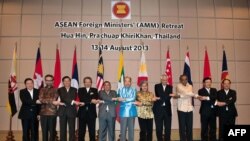Southeast Asian defense ministers are expected to hold fresh talks on territorial disputes as they meet with their counterparts from elsewhere in Asia, as well as the United States on Thursday.
The final day of the two-day meeting is being held at a Brunei resort overlooking the South China Sea, where several ASEAN member nations have tense overlapping territorial claims with China.
The ASEAN Defense Ministers' Meeting-Plus, as the gathering is known, is bringing together ministers from the 10 ASEAN nations, the United States, China, Japan, South Korea and other regional powers.
During Wednesday meetings with ASEAN defense ministers, U.S. officials said Defense Secretary Chuck Hagel discussed the need to enhance cooperation and lower tensions in the region.
Analysts do not expect a breakthrough on the disputes, as China has been reluctant to even discuss the issue at such meetings. It instead prefers to deal with each rival claimant separately, a position that gives it a much greater advantage.
A Thursday editorial in the Global Times, China's Communist Party's official mouthpiece, said the ASEAN meeting is not the appropriate place to resolve maritime disputes.
ASEAN foreign ministers have been pushing for China to work towards signing a binding Code of Conduct to help prevent conflict in the territorial disputes.
Brunei, the Philippines, Taiwan, Vietnam and Malaysia are embroiled in territorial disputes with China over several resource-rich islands in the South China Sea. Japan and China are engaged in a separate dispute in the East China Sea.
Many of the nations accuse China of using its rapidly advancing military to more aggressively defend what it views as its territory. Some of the nations have expanded their defense cooperation with the United States, as a result.
The Association of Southeast Asian Nations consists of Singapore, Brunei, Cambodia, Malaysia, Vietnam, the Philippines, Indonesia, Thailand, Burma, and Laos.
The ADMM-Plus will help lay the groundwork for October's East Asian Summit, which will be attended by world leaders, including U.S. President Barack Obama. The meeting is also expected to focus on other regional and international security and trade issues.
The final day of the two-day meeting is being held at a Brunei resort overlooking the South China Sea, where several ASEAN member nations have tense overlapping territorial claims with China.
The ASEAN Defense Ministers' Meeting-Plus, as the gathering is known, is bringing together ministers from the 10 ASEAN nations, the United States, China, Japan, South Korea and other regional powers.
During Wednesday meetings with ASEAN defense ministers, U.S. officials said Defense Secretary Chuck Hagel discussed the need to enhance cooperation and lower tensions in the region.
Analysts do not expect a breakthrough on the disputes, as China has been reluctant to even discuss the issue at such meetings. It instead prefers to deal with each rival claimant separately, a position that gives it a much greater advantage.
A Thursday editorial in the Global Times, China's Communist Party's official mouthpiece, said the ASEAN meeting is not the appropriate place to resolve maritime disputes.
ASEAN foreign ministers have been pushing for China to work towards signing a binding Code of Conduct to help prevent conflict in the territorial disputes.
Brunei, the Philippines, Taiwan, Vietnam and Malaysia are embroiled in territorial disputes with China over several resource-rich islands in the South China Sea. Japan and China are engaged in a separate dispute in the East China Sea.
Many of the nations accuse China of using its rapidly advancing military to more aggressively defend what it views as its territory. Some of the nations have expanded their defense cooperation with the United States, as a result.
The Association of Southeast Asian Nations consists of Singapore, Brunei, Cambodia, Malaysia, Vietnam, the Philippines, Indonesia, Thailand, Burma, and Laos.
The ADMM-Plus will help lay the groundwork for October's East Asian Summit, which will be attended by world leaders, including U.S. President Barack Obama. The meeting is also expected to focus on other regional and international security and trade issues.





